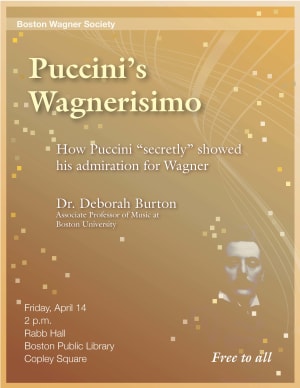Puccini's Wagnerisimo
Friday, Apr 14, 2023 2:00p -
3:30p
Where:
Boston Public Library: Rabb Lecture Hall
700 Boylston Street
Boston, MA 02116
Admission:
FREE
Categories:
History, Lectures & Conferences, Music
Event website:
https://bpl.bibliocommons.com/events/641332944eda9553005de69f
Join the Boston Public Library and the Boston Wagner Society for Puccini's Wagnerisimo: How Puccini "secretly" showed his admiration for Wagner. Associate Professor of Music at Boston University Dr. Deborah Burton will present on this topic as well as play some musical examples. Time permitting, there may be a brief audience Q&A following the lecture and performance.
Opera lovers may think of Wagner’s Isolde and Puccini’s Turandot as living in different operatic universes. But the truth—long hidden—is that Puccini was a devoted Wagnerian and emulated the German maestro throughout his career.
The antagonistic cultural milieu that pitted Verdi against Wagner (and, by extension, Italy against Germany) into which Puccini stepped at the start of his career has been well-documented. Verdi, a national hero of the Italian Risorgimento, saw his competition with Wagner in patriotic terms: in Autumn 1892 Verdi wrote, “the public wants Italian music and not imitations or travesties of German music. We need other stuff than ‘the Music of the Future.’” Since Puccini’s mentor was Giulio Ricordi, Verdi’s publisher and champion, and an anti-Wagnerian—at least until his firm acquired the Italian rights to the Wagner operas—the younger composer kept his affinities disguised.
This talk traces the many ways that Puccini “secretly” showed his admiration for Wagner, from his earliest opera to his last, Turandot, which was left unfinished at his death. On one “deathbed“ sketch that Puccini intended for the finale of that opera, he wrote “poi Tristano” – or “then Tristan.” We will see how he could have used a theme from Tristan und Isolde at that point.
Deborah Burton, Associate Professor of Music at Boston University, specializes in opera analysis and the history of music theory, emphasizing Italian sources. In 2022, she completed the finale to Turandot, Puccini's opera left unfinished at his death, using previously unaccessed autograph sketches. Dr. Burton's monograph, Recondite Harmony: Essays on Puccini’s Operas (2012) examines all of the composer's operas from an analytic point of view. She has organized events at the Metropolitan Opera and elsewhere in December 2010 for the centenary of Puccini’s Fanciulla del West, with a website www.fanciulla100.org, She taught a course on Puccini at the University of Rome, co-edited Tosca’s Prism: Three Moments of Western Cultural History (2004); and has published articles in Theoria, Studi Musicali, Nuova Rivista Musicale Italiana, Opera Quarterly, Rivista di Analisi e Teoria Musicale, The Opera Journal and other publications. Dr. Burton was president of the New England Conference for Music Theory from 2006-2008, and was an originator of and participant in the interdisciplinary conference “Tosca 2000” in Rome, honoring the centennial of Puccini’s opera.
Registration is not required for this particular program due to there being ample seating in Rabb Hall, but please note that seating is first-come, first-served.
About the BPL's COVID-19 health and safety protocols:
- Program attendees are recommended to wear masks covering their noses and mouths.
- Read the BPL's latest COVID-19 guidelines for visiting the library.
- Program performers will remove their masks during the program.
-

SponsoredAffordable Spanish Classes in Boston (in-person and online courses) | BASE
Monday, May 05, 2025 goes until 05/18
Boston Area Spanish Exchange (BASE)


